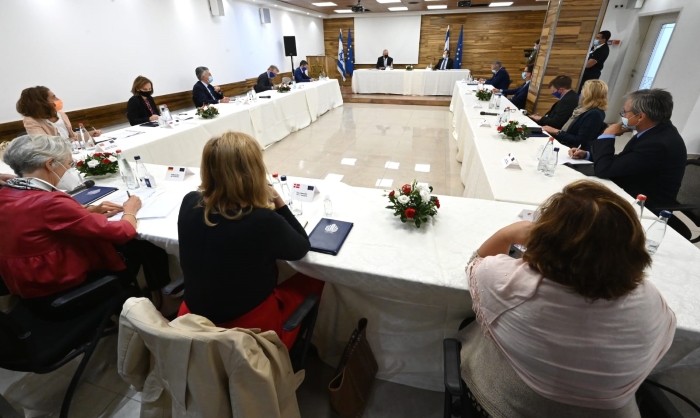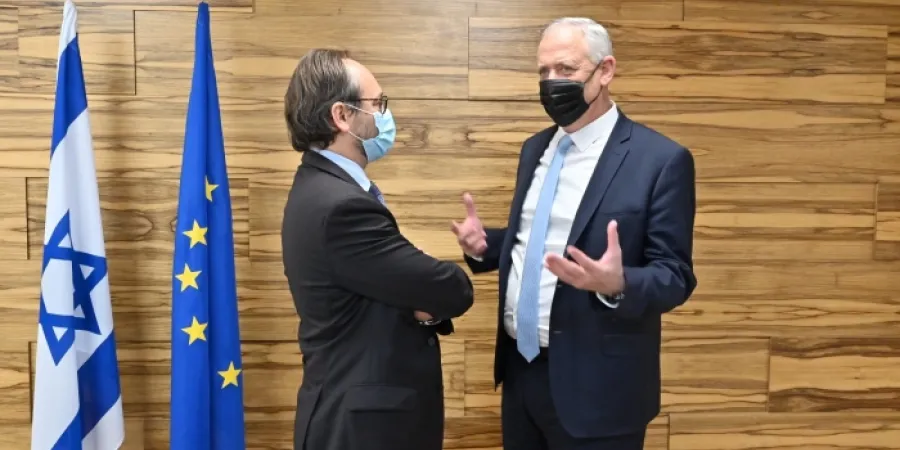Defense minister to EU envoys: Iran's quest for nukes could spark regional arms race
Not every agreement with Iran will bring about the desired outcome, Gantz says
IsraelDefense
| 05/11/2020
Israeli Defense Minister Benny Gantz met Thursday morning with the ambassadors of European Union countries for a town-hall briefing and Q&A session. The following are his key remarks:
On strategic regional shifts and the relations with the Palestinians: "I am glad that I was able to effectively convey our position against unilateral annexation to the American government and that we were able to encourage the pivot toward a strategy of pursuing regional peace. The Abraham Accords represent a conceptual and operative paradigm shift. The process may be gradual, but it will evolve over time, and offer an alternative vision for how we can all live together in this region. This is true of our relationship with the Palestinians as well. We need to be able to apply a new concept whereby we live together, but separately. We need to find the route to Palestinian sovereignty that does not jeopardize Israeli security. The only way to get there is through long-term dialogue. The Palestinians will not find a more receptive partner in the current government than me, and I hope they will take advantage of the opportunity to move themselves forward and leave rejectionism aside. Dialogue is the only path to resolution."
On conditions in Gaza: "The conditions in Gaza are unnecessarily poor and I would like to see economic development and conditions improve. I would never stop extending humanitarian aid, however my sole concern is with security; we need to make quiet and the return of Israeli fallen soldiers and captives a precondition for aid, and Europe can help communicate that."
On American and European attitudes toward Iran: "I am certain that we all share the goal of preventing a nuclear Iran, even while there might be differing approaches to achieving that goal. Iran is close to nuclear capacity and that would be a global problem, more than it would be an Israeli problem. I have no doubt that any American administration, will act to prevent Iranian nuclear capacity, whether through new or existing means. We must continue to apply a maximum pressure policy, while also communicating directly with the Iranian people. Our genuine desire for peace cannot delude us or prevent us from looking at reality in the eyes. Iran's quest for nuclear weapons could potentially spark a regional arms race and not every agreement will necessarily bring about the desired outcome."
Gantz shared a map of ammunition stores in Lebanon based on Israeli intelligence and said: "This is a disaster waiting to happen. There are too many homes in Lebanon that also serve as arms depots. The Lebanese state will need to be held accountable for the activity on its soil and you should communicate this through your governments to the Lebanese government. At the same time, I know new voices are emerging from within Lebanon and we have even begun to enter dialogue on maritime borders. I believe we can both learn from that type of process that dialogue is possible and productive. And were the Lebanese government to cease to be under the influence of Iran and Hizbollah, we could take an entirely different course toward dialogue and cooperation.
On Israel-EU relations: "Even though we might differ on policy and approach at times, there is a strong basis of shared values and interests. Recent events have highlighted the common challenges, like extremism and fundamentalism, and also the potential for positive change and the shift toward dialogue and normalization, which should be supported and encouraged all around."

Photo: Ariel Hermoni, Israeli Ministry of Defense
Not every agreement with Iran will bring about the desired outcome, Gantz says
Israeli Defense Minister Benny Gantz met Thursday morning with the ambassadors of European Union countries for a town-hall briefing and Q&A session. The following are his key remarks:
On strategic regional shifts and the relations with the Palestinians: "I am glad that I was able to effectively convey our position against unilateral annexation to the American government and that we were able to encourage the pivot toward a strategy of pursuing regional peace. The Abraham Accords represent a conceptual and operative paradigm shift. The process may be gradual, but it will evolve over time, and offer an alternative vision for how we can all live together in this region. This is true of our relationship with the Palestinians as well. We need to be able to apply a new concept whereby we live together, but separately. We need to find the route to Palestinian sovereignty that does not jeopardize Israeli security. The only way to get there is through long-term dialogue. The Palestinians will not find a more receptive partner in the current government than me, and I hope they will take advantage of the opportunity to move themselves forward and leave rejectionism aside. Dialogue is the only path to resolution."
On conditions in Gaza: "The conditions in Gaza are unnecessarily poor and I would like to see economic development and conditions improve. I would never stop extending humanitarian aid, however my sole concern is with security; we need to make quiet and the return of Israeli fallen soldiers and captives a precondition for aid, and Europe can help communicate that."
On American and European attitudes toward Iran: "I am certain that we all share the goal of preventing a nuclear Iran, even while there might be differing approaches to achieving that goal. Iran is close to nuclear capacity and that would be a global problem, more than it would be an Israeli problem. I have no doubt that any American administration, will act to prevent Iranian nuclear capacity, whether through new or existing means. We must continue to apply a maximum pressure policy, while also communicating directly with the Iranian people. Our genuine desire for peace cannot delude us or prevent us from looking at reality in the eyes. Iran's quest for nuclear weapons could potentially spark a regional arms race and not every agreement will necessarily bring about the desired outcome."
Gantz shared a map of ammunition stores in Lebanon based on Israeli intelligence and said: "This is a disaster waiting to happen. There are too many homes in Lebanon that also serve as arms depots. The Lebanese state will need to be held accountable for the activity on its soil and you should communicate this through your governments to the Lebanese government. At the same time, I know new voices are emerging from within Lebanon and we have even begun to enter dialogue on maritime borders. I believe we can both learn from that type of process that dialogue is possible and productive. And were the Lebanese government to cease to be under the influence of Iran and Hizbollah, we could take an entirely different course toward dialogue and cooperation.
On Israel-EU relations: "Even though we might differ on policy and approach at times, there is a strong basis of shared values and interests. Recent events have highlighted the common challenges, like extremism and fundamentalism, and also the potential for positive change and the shift toward dialogue and normalization, which should be supported and encouraged all around."

Photo: Ariel Hermoni, Israeli Ministry of Defense



